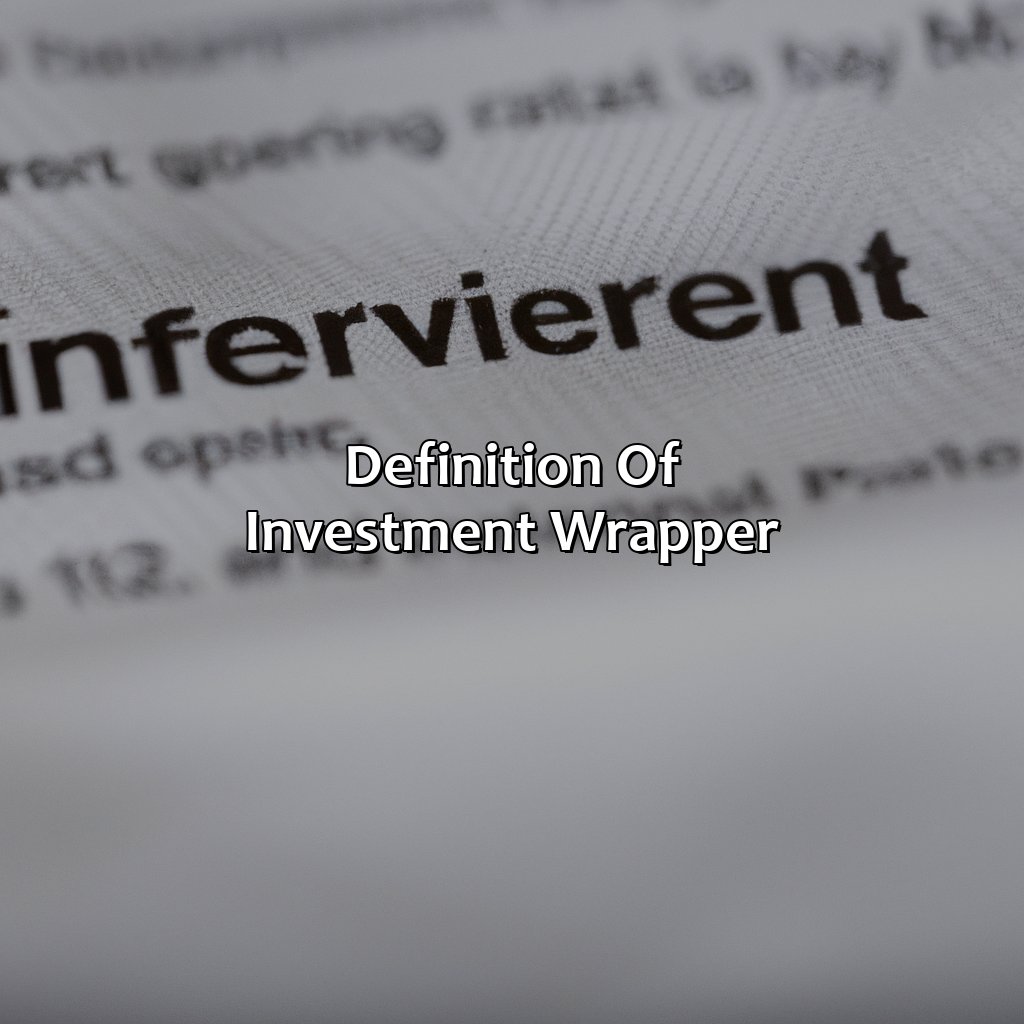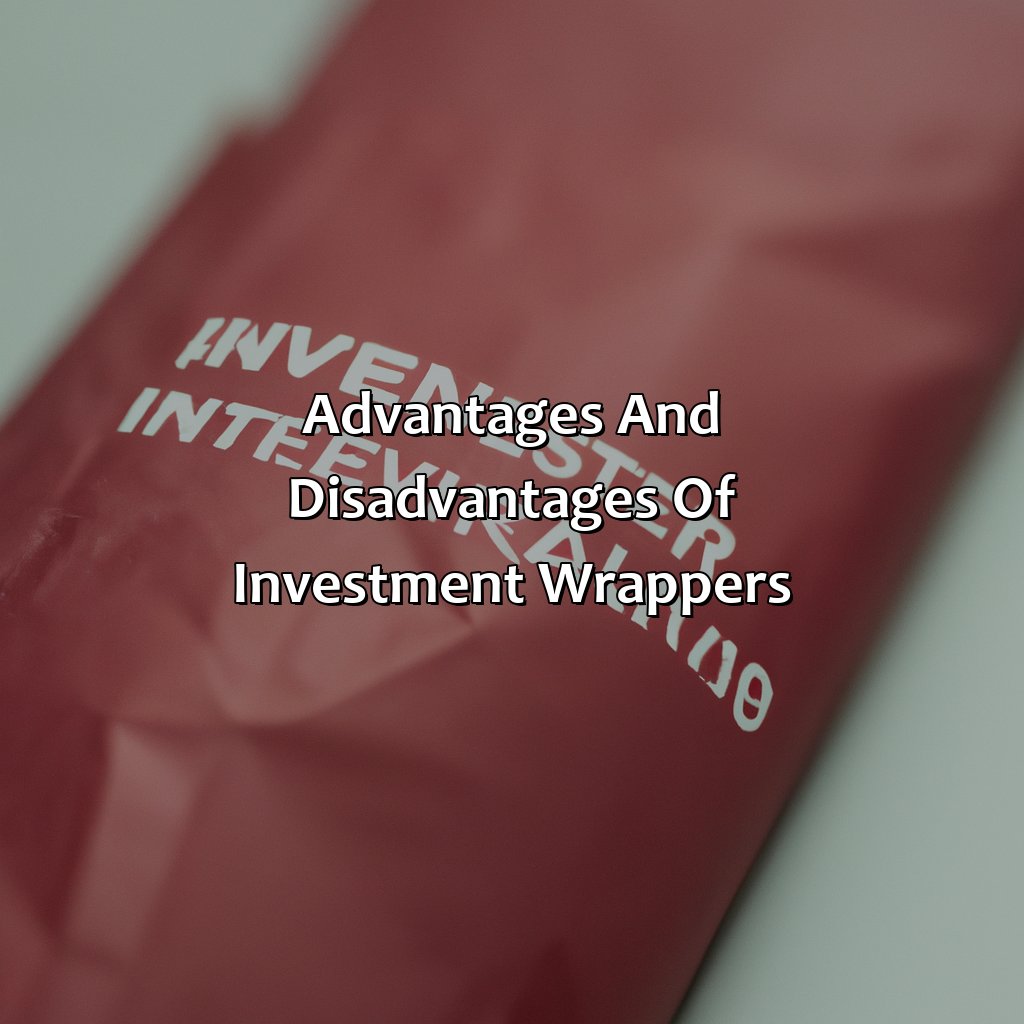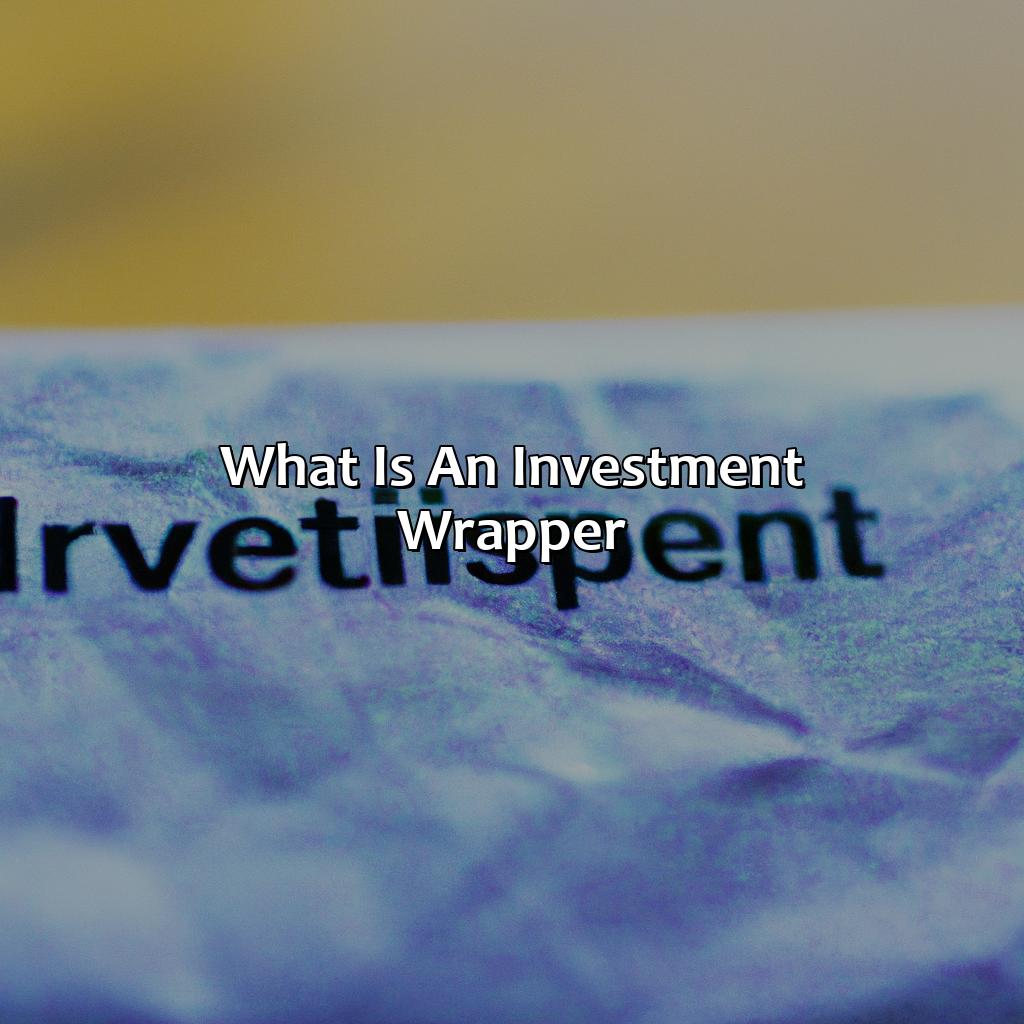What Is An Investment Wrapper?
Key Takeaway:
- An investment wrapper is a type of financial package that groups one or more investments together in a tax-efficient way. It allows investors to hold a range of investments within a single product, simplifying the management of their portfolio.
- The most common types of investment wrappers include unit trusts, investment bonds, individual savings accounts (ISAs), and pensions. Each wrapper offers different tax benefits and investment options, and investors should carefully consider their objectives and risk tolerance when selecting a product.
- Advantages of investment wrappers include tax efficiency, diversification, and simplification of portfolio management. However, they may also come with fees and charges, restrictions on access to funds, and limited investment options.
Are you wondering what an investment wrapper is? This article will help you understand the basics of this concept and how to make use of different investment wrappers to achieve your financial goals. You can make wise investment decisions with the right knowledge.
Definition of Investment Wrapper
Investment wrappers refer to financial products such as individual savings accounts (ISAs) and self-invested personal pensions (SIPPs), which allow investors to hold different types of assets in a tax-efficient manner. These products wrap investments in a tax-protected “wrapper” that shields them from capital gains tax and income tax. Investment wrappers offer flexibility to choose from a variety of investment options, including stocks and shares, bonds, and cash, allowing investors to diversify their portfolio. The wrapper’s tax-efficient nature makes it a popular choice for long-term investment goals like retirement planning.
It’s crucial to understand that each investment wrapper has its own rules and tax benefits. For example, ISAs are exempt from tax on any income or capital gains generated within the wrapper, while SIPPs receive tax relief on contributions at the individual’s marginal rate. Understanding the specifics of each wrapper and consulting a financial advisor is essential before investing.
Investment wrappers provide an efficient and tax-friendly way to invest in a diversified portfolio, avoiding expensive tax charges that can eat into investment returns. However, investors need to be mindful of their contribution limits and tax implications and should seek tailored financial advice to make informed investment decisions. Don’t miss out on the opportunity to build a financially secure future by investing through an investment wrapper!

Image credits: retiregenz.com by Harry Arnold
Types of Investment Wrappers
To pick the right investment wrapper for your goals, look at the four options – Unit Trusts, Investment Bonds, Individual Savings Accounts (ISAs), and Pensions. Each has its own benefits and features. It’s important to choose the one that best suits your needs.

Image credits: retiregenz.com by Adam Duncun
Unit Trusts
An investment vehicle that pools money from multiple investors to invest in a variety of assets such as stocks, bonds, and other securities is referred to as a Unit Invested Fund. These funds are managed by professional fund managers who buy, sell, and manage the assets on behalf of the investors in the fund. Unit Trusts are mainly for those who wish to invest indirectly. This type of wrapper gives access to investments that would otherwise require a significant amount of personal investment expertise.
Unit Trusts operate on an open-ended system; this means that the trust issues and redeems units based on demand from investors at any point in time. The net income generated is then put back into the trust or distributed among the unit holders periodically.
Unlike most other types of investment funds, investors in unit trusts may suffer a loss if the asset value declines, but they have the potential to benefit from positive market growth and receive returns in the form of income or capital gains. Moreover, diversification can help mitigate some of these risks.
Unit Trusts are an excellent choice for those who want to take advantage of market opportunities but lack time and expertise required when investing directly. Not only do they give small-time investors access to large-scale markets, but they also enable individuals with various risk profiles to invest according to their needs.
Investing is key to achieving financial stability, do not miss out on opportunities provided by Unit Trusts – start investing today!
The only bonds I’m interested in are investment bonds, because nothing says ‘I’m financially responsible’ like locking away your money for a set period of time.
Investment Bonds
Investment bonds are a type of investment wrapper that enables individuals to invest funds in a wide range of underlying investments, such as stocks and shares, without having to buy them directly. The bond issuer pools the funds from investors and invests them on their behalf. Investment bonds offer tax advantages, including the ability to defer paying taxes on any gains until the bond is cashed in or surrendered.
Investment bonds are available from various providers and can be customised according to an investor’s preferences. They typically come with fees and charges, including annual management charges and early exit fees. Many investment bonds also have minimum amounts required for investment.
Unique details include the fact that investment bonds can be used as an estate planning tool, as they can be written in trust and may not form part of an individual’s estate for inheritance tax purposes. Additionally, some investment bonds have guaranteed interest rates or capital guarantees, providing investors with some certainty about returns.
A famous history related to this type of investment wrapper is when former UK Prime Minister David Cameron invested £30000 in an offshore fund set up by his father, which was housed in an investment bond. This became controversial during his time in office due to allegations of tax avoidance.
ISAs – the only thing standing between you and being broke at 65.
Individual Savings Accounts (ISAs)
One of the most popular investment mechanisms is a tax-efficient savings account known as ‘ISAs.’ These accounts allow investors to save up to an annual predetermined amount, which is exempt from taxes. Additionally, ISA investments can be made into several different assets such as stocks, bonds, and mutual funds without facing any capital gains taxes upon profiting.
ISAs come with a variety of options depending on the investor’s preference; there are cash ISAs which provide interest on savings similar to that of bank accounts and stocks and shares ISAs which invest in financial instruments. A new type of ISA called Innovative Finance ISAs invest in peer-to-peer lending.
It’s important to remember that ISA’s should be considered when you’re aiming for long-term investments or retirement. With compound interest, your money can grow over the years. The earlier you begin investing, the more time you have for your assets to grow; neglecting investing sooner often results in FOMO (Fear Of Missing Out).
Saving for retirement is like preparing for a marathon, except you’re not sure if you’ll even make it to the starting line.
Pensions
Retirement investments that ensure future financial security are classified as annuities, income plans, or tax-free savings. Often employees can receive an employer contribution to pensions, establishing automatic retirement investments. These funds accrue interest until the worker retires when they begin to pay out a lifelong retirement income.
Other possible pension characteristics include participating in insurance and investment arrangements with varying levels of risk and reward. Annuities allow individuals to exchange lump sums of money for guaranteed lifetime payments at a fixed rate of interest. Income plans offset inflation by increasing payments each year.
It’s worth noting that workplace pensions may integrate with a self-invested personal pension (SIPP), allowing greater control over where your money is invested. A SIPP provides access to a wide range of investment options, including funds, shares, and commercial property.
Pro Tip: Ensure consistent payments into your pension as early as possible to maximize investments and potential growth opportunities. Deciding whether to use an investment wrapper is like deciding whether to wear a bulletproof vest – it may protect you from harm, but it’s not exactly the most fashionable choice.
Advantages and Disadvantages of Investment Wrappers
To comprehend the pros and cons of investment wrappers, you must be mindful of the potential advantages and disadvantages. This requires analyzing two parts: advantages and drawbacks. Examining these parts will support you in deciding wisely when deliberating investment wrapping as an answer for managing your finances.

Image credits: retiregenz.com by Joel Duncun
Advantages
When utilizing investment wrappers, various benefits are accessible for investors:
- This financial instrument enables tax advantages for investors due to its efficient management of funds. In addition, investment wrappers provide investors with the flexibility to modify their portfolios without incurring risks or significant expenses.
- Moreover, diversification is an added advantage of investment wrappers. When creating an investment portfolio, it is critical to have diversification between different types of securities. This can be challenging for individual investors; however, investment wrappers offer well-diversified plans that mitigate risk and ensure steady growth.
- Furthermore, research suggests that annuities are one of the most popular wrap structures among professionals today. According to a source by Investopedia, there has been a surge in popularity towards variable annuities over the last few years due to favorable legislation created to safeguard clients’ interests.
- Additionally, some companies bundle their products together using “Wrapped” funds. This means that instead of purchasing shares individually, one can acquire shares in one fund made up of different assets.
- In summary, these financial tools have numerous advantages; however, investors should consider charges and fees before committing. Remember, investing in a wrapper doesn’t mean you can just wrap your problems away – taxes and fees can still come back to bite you.
Disadvantages
Investment Wrapper Challenges
Investment Wrappers come with unique advantages and limitations. Here are six disadvantages you need to be aware of if you plan to invest in them:
- Higher Fees: Investment wrappers usually charge higher fees than traditional investments
- Limited Offering: Some investment wrappers limit the types of assets or funds they offer
- Riskier Investments: Investment Wrappers may bank on riskier investments to produce results.
- Tax Implications: With some investment wrappers, your taxes may become costly and challenging.
- Restrictions: Certain investment wrappers have restrictions that may restrict your access to funds when required.
- Complexity: Some investors feel overwhelmed by the complexity of investment wrapper offerings.
It is worth noting that some Investment Wrappers may present challenges specific to their structure. Be sure to investigate and analyze any Alternative Investments carefully before moving forward.
One investor I talked with had experienced challenging tax implications after investing in an “Alternative-Investment” wrapped portfolio advertised as tailor-made for high-net-worth individuals. Despite the promised tax efficiency, he paid over $20,000 in taxes for 2 years on a capital-gains return of only $25,000, about 80%.
Factors to Consider when Choosing an Investment Wrapper
When choosing an investment wrapper, various factors need to be considered to ensure that the best choice is made. These considerations include the tax implications, level of flexibility, cost of administration, and investment options available.
The tax implications are essential as they influence the efficiency of the investment. The level of flexibility also plays a critical role, as it determines how easy it is to make changes to the investment. Cost of administration is also an important factor that affects the overall returns and should be minimized as much as possible. Lastly, the available investment options should be evaluated to determine if they meet your investment objectives.
Beyond these considerations, it is essential to choose the right investment wrapper that aligns with your investment objectives and risk tolerance. There are various types of investment wrappers, including mutual funds, exchange-traded funds (ETFs), individual retirement accounts (IRAs), 401(k) plans, and annuities. Each wrapper has its benefits and limitations, and it is crucial to consider them before making a choice.
Moreover, it is important to note that the investment wrapper selected will significantly impact the returns of the investment. For instance, tax benefits from an IRA can result in higher returns due to lower tax rates. Additionally, opting for a low-cost investment wrapper like an ETF can help maximize returns by minimizing administrative fees and expenses.
According to a recent report by Reuters, the investment industry has witnessed an increase in the usage of exchange-traded funds due to their low-cost nature, flexibility, and diversification benefits.
Choosing the right investment wrapper can be overwhelming, but carefully considering all the factors mentioned can significantly increase the chances of making the best choice.

Image credits: retiregenz.com by Yuval Woodhock
Five Facts About Investment Wrappers:
- ✅ An investment wrapper is a financial product that allows investors to hold and manage various investments in one place. (Source: Investopedia)
- ✅ Investment wrappers can include taxed and tax-free savings accounts, stocks and shares ISAs, and pensions. (Source: Money Advice Service)
- ✅ Investment wrappers provide flexibility to switch investments without incurring tax penalties. (Source: Telegraph)
- ✅ Some popular investment wrappers in the UK include the ISA and SIPP. (Source: The Balance)
- ✅ Investment wrappers are not a guarantee of investment success and investors should carefully consider their options and do their research before investing. (Source: Financial Times)
FAQs about What Is An Investment Wrapper?
What is an investment wrapper?
An investment wrapper is a financial product that allows you to hold a range of different investments in one place.
What are the different types of investment wrappers?
There are several different types of investment wrappers, including Individual Savings Accounts (ISAs), Self-Invested Personal Pensions (SIPPs), and Investment Bonds.
How do investment wrappers work?
Investment wrappers work by pooling your money with that of other investors and investing it in a range of assets, such as stocks, bonds, property, and cash. The wrapper then provides different tax advantages or allowances, depending on the type of wrapper you hold.
What are the tax advantages of investment wrappers?
ISAs offer tax-free savings, meaning you won’t pay any income tax or capital gains tax on any interest, dividends, or profits you make. SIPPs offer tax relief on contributions and allow you to build up a pension pot free of tax. Investment bonds also have tax advantages, as any growth on the underlying investments is taxed within the bond rather than personally.
What are the benefits of using an investment wrapper?
Investment wrappers offer a range of benefits, including diversification, tax advantages, professional management, and ease of management. By using an investment wrapper, you can access a range of different investments, benefit from tax advantages, and leave the management to the professionals.
What are the risks associated with investment wrappers?
The risks associated with investment wrappers depend on the underlying investments, as different assets carry different levels of risk. You should always conduct thorough research and seek professional advice before making any investments, as there is no guarantee that you will achieve the returns you are looking for. Additionally, investment wrappers also come with fees and charges that can eat into your returns.


